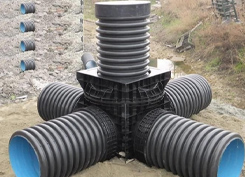Nov . 21, 2024 11:05 Back to list
dn150 hdpe service
Understanding DN150 HDPE Service Applications, Benefits, and Considerations
High-Density Polyethylene (HDPE) is a widely utilized thermoplastic known for its durability, resistance to impact, and excellent chemical stability. One of the most common standards for specifying the diameter of pipes, valves, and fittings is the DN (Diameter Nominal) system. This article focuses on DN150 HDPE service, examining its applications, advantages, and important considerations in various industries.
What is DN150?
DN150 refers to a nominal diameter of 150 millimeters or approximately 6 inches. This standard measurement is critical in the design and operation of piping systems, allowing engineers to specify components with compatible sizes. DN150 pipes made from HDPE are widely used for various services due to their flexibility and performance characteristics.
Applications of DN150 HDPE Pipes
1. Water Distribution DN150 HDPE pipes are commonly employed in potable water distribution systems. Their resistance to corrosion and chemicals makes them ideal for carrying drinking water without contaminating it. HDPE pipes are also less likely to corrode over time compared to traditional materials like steel or cast iron.
2. Wastewater Systems In municipal and industrial wastewater applications, DN150 HDPE pipes provide a reliable solution for transporting sewage and effluents. Their smooth interior surface minimizes friction and reduces the potential for blockages. Additionally, the strength of HDPE allows it to withstand the harsh environments often found in these systems.
3. Irrigation Agriculture relies heavily on efficient irrigation systems, and DN150 HDPE pipes are frequently used for this purpose. They can transport large volumes of water at low pressure, making them suitable for various irrigation methods, including drip and sprinkler systems.
4. Telecommunications In the telecommunications sector, DN150 HDPE pipes serve as conduits for fiber optic cables and electrical wiring. The strength and flexibility of HDPE allow for easy installation and protection of sensitive cables.
5. Gas Distribution HDPE is increasingly used for natural gas distribution due to its resistance to stress cracking and excellent fusion capabilities. DN150 HDPE pipes can safely transport natural gas while minimizing the risk of leaks.
Advantages of DN150 HDPE Service
1. Durability HDPE pipes boast a long lifespan, often exceeding 50 years. They resist environmental stressors, including UV radiation, chemical exposure, and extreme temperatures.
dn150 hdpe service

2. Flexibility The flexibility of HDPE makes it easier to install, especially in challenging terrains. This can reduce the need for fittings and joints, simplifying the installation process and reducing potential leak points.
3. Lightweight Compared to traditional materials, HDPE is considerably lighter, making handling and installation more manageable. This can lead to reduced transportation costs and quicker installation times.
4. Low Maintenance Once installed, DN150 HDPE systems require minimal maintenance. Their resistance to corrosion and biofouling means fewer repairs and replacements, ultimately leading to cost savings.
5. Environmental Impact HDPE is recyclable and can be reused, which lessens its environmental impact. The material's durability also means fewer resources are needed for replacements over time.
Important Considerations
While DN150 HDPE pipes offer numerous advantages, there are some considerations to keep in mind
1. Thermal Expansion HDPE pipes can expand and contract with temperature changes. Proper installation techniques must be employed to accommodate these shifts.
2. Joining Methods While HDPE pipes can be joined using various methods (e.g., butt fusion, electrofusion), it's crucial to follow best practices to ensure strong, leak-free joints.
3. Pressure Ratings Different applications may require specific pressure ratings. It’s essential to choose the right pressure class for the intended use to prevent failures.
4. Soil Compatibility Although HDPE shows excellent resistance to chemicals, compatibility with the soil and environment must be considered during installation to avoid degradation.
Conclusion
In summary, DN150 HDPE service represents a versatile and robust solution for a myriad of applications ranging from water distribution to gas transport. With its outstanding properties of flexibility, durability, and resistance to environmental factors, HDPE is proving to be a material of choice in modern infrastructure projects. However, proper installation and maintenance considerations are essential to maximize the advantages of DN150 HDPE pipes and ensure reliable service over their lifespan.
-
High-Quality PVC Borehole Pipes Durable & Versatile Pipe Solutions
NewsJul.08,2025
-
High-Quality PVC Perforated Pipes for Efficient Drainage Leading Manufacturers & Factories
NewsJul.08,2025
-
High-Quality PVC Borehole Pipes Durable Pipe Solutions by Leading Manufacturer
NewsJul.08,2025
-
High-Quality PVC Borehole Pipes Reliable PVC Pipe Manufacturer Solutions
NewsJul.07,2025
-
High-Quality UPVC Drain Pipes Durable HDPE & Drain Pipe Solutions
NewsJul.07,2025
-
High-Quality Conduit Pipes & HDPE Conduit Fittings Manufacturer Reliable Factory Supply
NewsJul.06,2025

